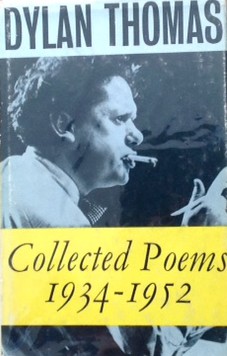Inspiring Older Readers
 posted on 27 Oct 2023
posted on 27 Oct 2023
Notes in the margins
Few books are more evocative of my final year at university than the Dent hardback edition of Dylan Thomas’ collected poems which, even now when I pick it up, can take me back to the chairs and tables of Bangor University library. I think it’s probably fair to say that I spent way too much time obsessing over what Thomas did or didn’t mean, to the exclusion of doing something more useful – or at least spending my time reading other works that would have contributed to my puny efforts to get a degree.
I suspect I had slipped into a sort of compulsive behaviour designed to bring me comfort and security. Every day I would head for the same table and begin the task of making futile annotations in the margins of the poems as if they would in some way add value to my understanding of them. Now, when I turn the pages and see that spidery, pointless scribble and asinine underlining I get a little shudder of shame.
I know that for some people marginalia is a fascination and that the notes made by great writers and thinkers either before or after they become famous are eagerly sought after. In some cases scholars have been able to use these marginal notes to unwrap the origins of explosive ideas or the genesis of a masterpiece. I can say without fear of contradiction that never has the gulf between great writers and dopey students been clearer than in their marginal notes. In this case, anyone stumbling over this book at some later date (it wont be leaving me until I die or become so demented I don’t care) will discover that I belonged quite firmly to the ‘dopey student’ category and that I had absolutely no insights of any value to share in my margins.
Quite the opposite in fact. The pencil notes that creep down the pages of this book are quite breathtakingly dim. The only comfort I can take is that I’m not alone – there must be plenty of copies of Milton, Shakespeare, Tennyson, Keats and the rest littering second hand bookshops that are infested with this pencil-based fungus that passes as critical comment. Probably the one that sets my teeth on edge most effectively is the bold marking of a word or passage and the single word observation ‘Yes!’. What on earth is that supposed to mean? That you, in all your wisdom, are validating the author’s efforts with your blessing? Or maybe, ‘yes, I’d never noticed that but now you come to mention it………’ Or even, ‘yes, you and me, we see things those other plebs don’t’ ?
And then there’s the irritating check list – ‘satire’, ‘irony’, ‘comedy’ – or the reminder to yourself to remember ‘makes link with nature’ or ‘making contrasts’. Whatever form they come in they have a common characteristics – they are utterly useless and without the slightest critical merit.
But at least annotating in this way made you feel you were at least doing something. One of the problems with studying a subject like literature is that you feel you have to do student type things to justify your time – somehow just reading isn’t, or wasn’t for me, enough. This reading had to be made real and concrete in the outside world and what better way to show you were engaged in a meaningful intellectual exercise than to scribble notes on the pages of your books – regardless of the nature or quality of those scribbles.
I still love Dylan Thomas and I still love that book with all its associations. I could have erased those pencil notes a long time ago but I never have – somehow that link between me then and me now is an important thing, for the sake of humility if for nothing else. I never scribble in the margins of books now and I have absolutely no desire to do so – I can see no reason to do it. If a passage or an idea strikes me as especially important and I feel that I might want to return to it I use a post-it note or page marker. I’m pretty sure I don’t have too many profound insights into the world and its complexity but I’m damn certain that if I had I couldn’t write it in the narrow margins of a book.
Maybe all students have to go through the process of learning for themselves that scribbling in ( sorry, annotating) books isn’t in the end going to help them do better in their studies but, ultimately, it may provide them with a rueful smile at their own expense at some date in the future.
Terry Potter
October 2023